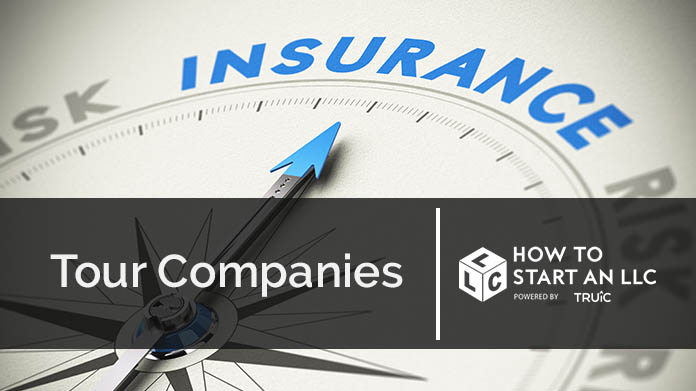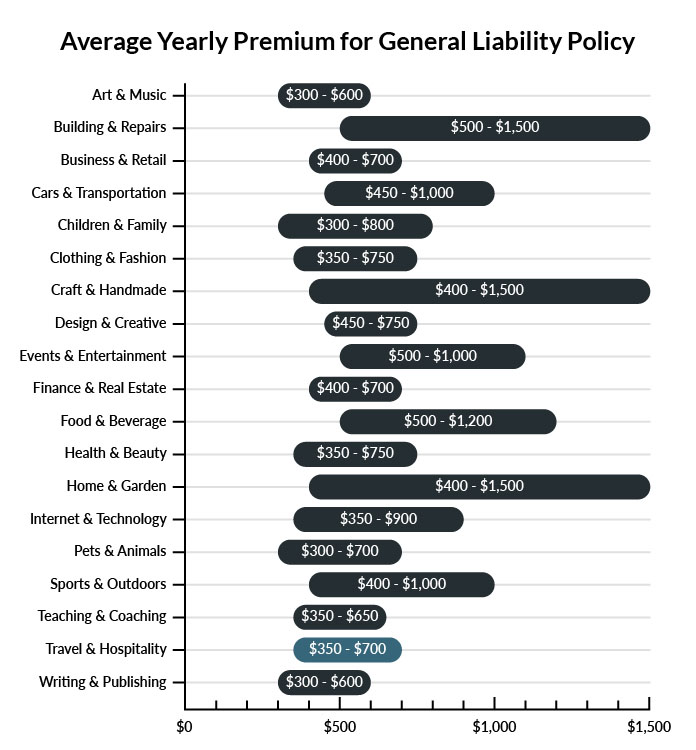Tour Company Insurance
Getting business insurance for your tour company is essential; tour companies need to be protected against things like accidental injuries, negligent omissions, and contract violations.
For example, if a tour guide fails to warn your customers about a potentially hazardous element of your tour (e.g., weather, slippery ground, etc.) and someone gets injured, a compensation lawsuit could be filed against you.
We’ll help you find the most personalized and affordable coverage for your unique business.

Recommended: Next Insurance is dedicated to matching small businesses with the right policy at the best price.
Best Insurance for a Tour Company
General liability insurance is — generally speaking — one of the most important insurance policies for tour companies.
Some of the risks general liability insurance covers are:
- Bodily injury
- Property damage
- Medical payments
- Legal defense and judgment
- Personal and advertising injury
Having said that, it is important to understand that not all tour companies will be “fully” covered with a simple general liability policy.
This means that — depending on your business’s unique risks — you may benefit from acquiring additional coverage:
- Business income: Will cover part of your lost income in the event that you are required to temporarily stop operating (e.g., due to fire damage, etc.).
- Professional liability: Will cover liability that arises as a result of a negligent act or omission.
- Workers’ compensation: Will cover employment law-related claims (e.g., injuries, payment disputes, etc.).
You will also need to decide what type of business provider you will use; there are two options available, both of which come with different benefits:
- Traditional brick-and-mortar insurers: Have operated for several decades and have sustained a consistent track record of top-tier financial ratings (e.g., Nationwide, etc.).
- Online insurers: Use AI in order to offer personalized quotes without an insurance agent (e.g., Tivly, Next Insurance, etc.).
All in all, we recommend going for an online insurer as a small business. This is because online insurers — generally speaking — have lower operating costs and can thus afford to offer coverage at more affordable rates.
Let's Find the Coverage You Need
The best insurers design exactly the coverage you need at the most affordable price.
Cost of General Liability Insurance
On average, tour companies in America spend between $350 - $700 per year for $1 million in general liability coverage.
Compare the average cost of general liability insurance for a tour company to other professional industries using the graph below.
Several factors will determine the price of your policy. These include your:
- Location
- Deductible
- Number of employees
- Per-occurrence limit
- General aggregate limit
You may be able to acquire general liability insurance at a discounted rate by purchasing it as part of a business owner’s policy (BOP) rather than as a standalone policy.
A BOP is a more comprehensive solution that includes multiple forms of coverage, such as business interruption and property insurance.

Find the Best Rate
Discover the best coverage at the lowest rate in our low-cost business insurance review.
Common Situations That General Liability Insurance May Cover for a Tour Company
Example 1: While using the restroom before a tour, a customer falls and breaks his wrist. General liability insurance would cover the injured customer’s medical expenses.
Example 2: You are overheard making negative comments about a competitor’s services and have been named in a defamation lawsuit. A general liability policy would cover your legal representation and court-awarded damages.
Example 3: You are considering expanding to a neighboring town and have applied for a loan. General liability insurance would help fulfill your lender’s liability insurance requirement.
Other Types of Coverage Tour Companies Need
While general liability is the most important type of insurance to have, there are several other forms of coverage you should be aware of. Below are some of the most common types of coverage:
Commercial Auto Insurance
If you use a business vehicle on public roadways, state law requires you to carry a commercial auto insurance policy. This policy covers the cost to repair or replace third-party property, the company’s damaged vehicle, and any lost/damaged equipment. Because the state-mandated minimums leave many businesses underinsured, you are encouraged to discuss policy coverages at length with your insurance professional.
Workers’ Compensation Insurance
State law mandates that any business with employees must carry workers’ compensation insurance. This coverage pays medical bills stemming from an on-the-job injury and/or illness and a percentage of the employee’s lost wages when their injuries render them unable to work. If a related lawsuit arises, it also ensures the business owner is properly defended in court and covers awarded damages.
Commercial Property Insurance
If your business operates out of a commercial building, you will likely need to purchase a commercial property policy. This policy covers both the structure of your property and any business property lost, stolen, or destroyed in a covered event.
Crime Insurance
Employee dishonesty, fraud, and forgery are specifically excluded from a standard business owner’s policy. Crime insurance provides coverage if a loss occurs due to criminal activity, reducing the chances of a gap in coverage.
Additional Steps To Protect Your Business
Although it’s easy (and essential) to invest in business insurance, it shouldn’t be your only defense.
Here are several things you can do to better protect your tour company:
- Use legally robust contracts and other business documents. (We offer free templates for some of the most common legal forms.)
- Set up an LLC or corporation to protect your personal assets. (Visit our step-by-step guides to learn how to form an LLC or corporation in your state.)
- Stay up to date with business licensing.
- Maintain your corporate veil.
Tour Company Insurance FAQ
Yes, absolutely. You will need to first get a quote from an online business insurance provider like Next Insurance. Next allows you to then purchase a policy immediately and your coverage will be active within 48 hours.
A typical business owner’s policy includes general liability, business interruption, and commercial property insurance. However, BOPs are often customizable, so your agent may recommend adding professional liability, commercial auto, or other types of coverage to your package depending on your company’s needs.
"Business insurance" is a generic term used to describe many different types of coverage a business may need. General liability insurance, on the other hand, is a specific type of coverage that business owners need to protect their assets.
Yes. Even though this may not be a legal requirement (depending on your state and employee structure), we recommend getting the applicable business insurance policies before you begin operating so that you are covered as soon as you start interacting with clients.
This will ensure that you avoid having to pay an exorbitantly high claim on your own.
Not necessarily. Certain exceptions may be written directly into your tour company insurance policy, and some perils may be entirely uninsurable.
Yes, an LLC is meant to create a legal barrier between your business and your personal assets and credit. If you haven’t formed an LLC yet, use our Form an LLC guide to get started.
An LLC doesn’t protect your business assets from lawsuits and liability– that’s where business insurance comes in. Business insurance helps protect your business from liability and risk.